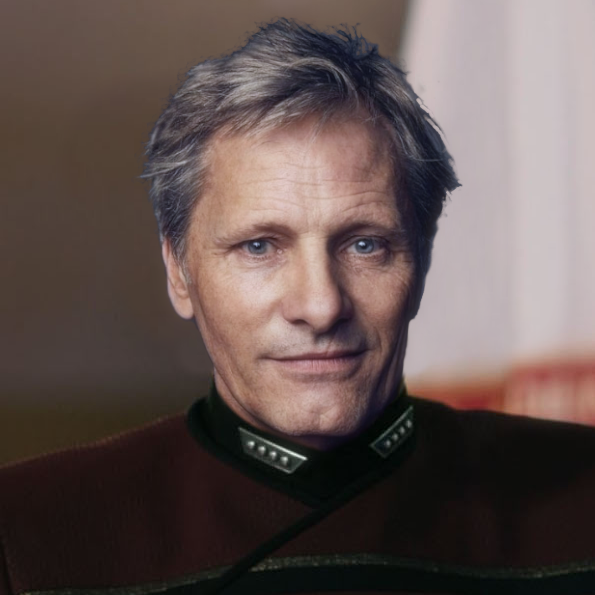Lieutenant Balan couldn’t be more excited. They were going to do it. They were going to attempt a call to their mysterious watchers, a true first contact opportunity. Chief Shafir deserved most of the credit. That woman could break into any computer system, even one built under a different mathematical basis by an alien species that was a mystery to them using a language unknown to them. Standing at the head of the Briefing Room, the two presented the details.
“The quantum gravimetric processor we found on the planet was a Rosetta Stone for us,” explained Chief Shafir to the ship’s senior staff. “Every processing system, regardless of its inner workings, requires an instruction set to efficiently write code against it. Through trial and error, we developed a working understanding of the persistence accessors within that set, and then pulled as much raw signal as we could.”
Because they had no way to relocate the system they’d found on the planet, since they didn’t even understand how its power source could exist as it violated the laws of physics, the Chief and an away team had set up camp in the square on the abandoned world to do this work. She’d been down there for the better part of the first six days they’d been stranded in orbit.
“We had no way to know what we were pulling, or when we were done pulling, because the system is not deterministic in a traditional computational sense. However, once we achieved a suitably high degree of signal duplication across the wire, we concluded we had enough to start the next phase of work so we returned to the ship. ”
After they got back from the planet though, they were dead in the water because they had no way to interpret the raw signal. It didn’t help that Dr. Lockwood told them to bugger off because his team was busy with more important things. Speaking of which, where was Dr. Lockwood now? The whole senior staff was here, except for him.
“The problem after the download was that the signals were non-interpretable within our framework of computation,” Shafir continued. “Fast forward to two days ago though, and Admiral Reyes brought us the solution, a higher-order tensor transformation to convert the raw signals into a quantum form suitable for data analysis with our onboard processing units.”
It had been a real surprise when Reyes showed up in her lab unannounced. It had been even more of a surprise when the Admiral explained she’d done the math and constructed a solution to their problem herself. Why was a Fleet Admiral doing the work instead of the physicists and mathematicians on the Astrophysics and Exotic Sciences team?
“Once we plugged in the Admiral’s transformation, it was just figuring out enough of the digital structure to start extracting meaning from what we retrieved,” explained Shafir, before gesturing to the Lieutenant by her side who’d been instrumental in the next phase due to her gifts with language.
“Building out a syntax tree and tokenizing the flow,” explained Lieutenant Balan, “we deciphered a basic understanding of their syllabic language, enough that we could train the universal translator. The training has gaps for sure though. Their language does not share a common root with any known languages, as one would expect of a species isolated from the rest of the galaxy. Thankfully though, the source material on the device we found was substantial so we could infer a lot through patterns of repetition one expects to find within written text.”
“So we have enough to have a conversation?”
“Presumably, as long as they speak the same language or a derivative of it.”
Captain Devreux then jumped in: “And from an operational perspective, we understand enough about their signaling protocols from the work the Chief did. Assuming they’re using technology similar to that on the planet below, and with the assistance of the spectral modification from Lockwood’s sensors modifications, we should be able to modulate our comms array to establish a channel.”
Admiral Reyes nodded. It was as good a shot as any. If it didn’t work, and the call just went out into the void, their situation would be unchanged from the present, and they’d still have to hang their hopes on the aberrations of a scientist gone mad. “Has anything new developed on the edge of the system?”
“As you know, two more objects were detected on our sensors early this morning with the same signature as the others,” explained Captain Devreux. “Since their arrival, they have assumed a stationary position near the other three, but no additional developments.”
Commander Lewis, from his solitary position in the far corner of the room, furled his brow. The moment they detected those two new arrivals, the Chief Intelligence Officer had lobbied yet again for the Polaris to go to red alert. Beyond proving beyond a doubt that these unknown objects were anthropogenic in nature, and not just some fluke interstellar phenomenon, it had the smell of a task group amassing for an assault.
“Well, since we don’t have other reasonable options, I think it’s time we try to call our friends,” concluded the Admiral. “Lieutenant Balan, any guidance from what you’ve gotten out of the data dump?”
“Unfortunately, not much,” the cultural affairs advisor responded. “From what we’ve translated, the computer system we found appears to have been an operational system for some agency within a local government. A lot of stuff about plaza construction, waste collection, metro news, and upcoming events – a treasure trove of conversational and procedural documents that simplified language model construction – but nothing of note to explain their perspective on interstellar relations or what caused all the damage we found on the planet below.”
“If your city is under attack, or your people are at war, wouldn’t you think that would feature prominently in basically every piece of written material?” asked Commander Lewis, sitting up in his chair.
“It is possible we just didn’t manage to pull the relevant data,” answered Balan.
“Or it is possible that whatever destroyed the city happened very fast,” Lewis countered.
“Yes, I suppose.” Balan wondered why Lewis always had such a dark attitude about everything.
The Commander pushed the point: “So what if the denizens of the planet are not the same folks that are watching us now? What if the planet was destroyed by the same hostile force that is now amassing on the edge of the system?” Lewis always spoke in a serious tone, even when ordering a snack from the replicator, but the gravity of his questioning caused the momentum of the room to shift.
“We can always ask them when we call,” the Admiral chuckled, attempting to lighten the mode before Commander Lewis dragged their confidence down too far.
The Chief Intelligence Officer did not look amused.
“But in all seriousness Commander,” continued Admiral Reyes, “if you are right, and they are here to kill us, we’re going to find out eventually either way. They have FTL capabilities, and we do not. They have unknown capabilities, and we can only discern their shadows on sensors. If anything, would engaging them now not provide us with less of a tactical disadvantage than engaging them at a later point after they have reinforced their forces further?”
Commander Lewis sighed. He knew Allison Reyes to be a very competent, adaptable and pragmatic leader, one that did not jump to conclusions early, but when her mind was made up, there was nothing you could do to change it. One fact was missing from this discussion though. Why was Dr. Lockwood’s work to model local subspace and enable superluminal travel no longer an option? And for that matter, where was Dr. Lockwood right now? Lewis knew better than to raise that question in this setting though. When Reyes did not share something, she usually had a good reason.
“Captain Devreux, please bring the ship to full readiness and have all personnel report to battlestations,” Admiral Reyes instructed. “However, do not raise shields, do not activate weapon systems, do not launch starfighters, and for that matter, do not do anything that could be construed as a threat. This is a first contact situation, and we will treat it as a positive one until proven wrong. Let’s plan to dial our friends in thirty minutes time.”
Captain Devreux nodded dutifully, while Commander Lewis sat there with his arms crossed and a look of displeasure on his face. Around the room, the rest of the officers were a mixed bag. A few, like Lieutenant Balan, looked excited at the prospect of first contact with a new alien species, but most, still stuck on the Chief Intelligence Officer’s words, looked concerned.
“Dismissed.”
Quickly, the senior staff rose and headed out. Commander Lewis stayed seated though. When the door finally closed, it was only him and the Admiral left in the room.
“Allison, what about Lockwood’s work?”
“It is my opinion, and Dr. Hall’s opinion, that he is compromised. He is too close to this. It’s the echoes of his trauma from the half decade he spent stranded in the Delta Quadrant.”
“Shouldn’t that just inspire him to dig us out of this mess?” Lewis asked. If their places were certainly reversed, it would just be all the more motivation to solve the problem.
“He’s not you, my friend,” Reyes counseled. “What do you do when you get punched?”
“I engage them, and I keep on pressing until they are no longer a threat.”
“Well, in the same situation, Dr. Lockwood would curl up in a ball and start shaking.”
“Can’t he just man up and push through?”
“That’s the sort of advice I’d give you,” Reyes smiled for a moment, but then it turned to a frown as she continued to explain. “But he’s not you. He’s panicked, and in desperation, he may be convinced he found a solution. And this isn’t a phaser fight. If you miss a shot, you just fire again. If he misses, this ship and all its crew ends up stardust scattered across the system. Something as simple as an unmodeled perturbation that causes non-constant acceleration across the warp bubble. Subspace physics is incredibly complicated, and the strange spacetime we find ourselves in here exponentiates that.”
The Commander did not look happy with that answer, but not because he disagreed with Reyes. She was probably right. Rather, his problem was with Dr. Lockwood. How could someone fail to rise to the call of duty when his compatriots depended on him?
“Well, I better go assemble my team,” Commander Lewis said as he got up to leave before he said something stupid. “I hope you’re right, and I’m wrong, that this gambit plays out for the best. But the universe has a habit of proving my pessimism right.”
As the Admiral watched him leave, she hoped he was wrong.

 Bravo Fleet
Bravo Fleet








